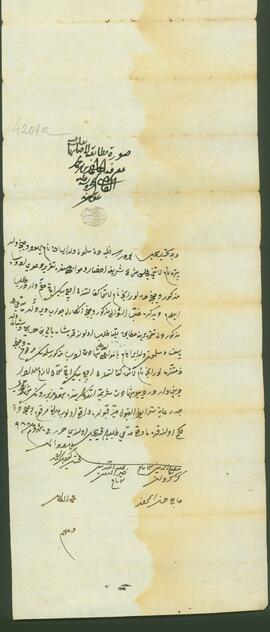- HR-DADU-07-HR-DADU-07.2-HR-DADU-07.2.1
- Subseries
- 1458, 1460, 1462, 1468-1469, 1471-1473, 1475-1476, 1478-1493, 1495–1511, 1513-1521, 1523-1534, 1536-1541, 1543-1547, 1549-1687, 1689-1691, 1694-1698, 1701, 1703-1707, 1709-1713, 1715-1746, 1748-1772, 1774-1787, 1789-1795, 1797-1799, 1801, 1803-1805
The subseries consists of four types of sultans’ documents: charters (Tur. ahdname, ahitname), decrees (Tur. ferman), decrees of special importance (Tur. hatt-ı hümayun) and diplomas (Tur. berat), which were issued in the period from the middle of the 15th to the beginning of the 19th century. The documents of this subseries primarily deal with trade, shipping, customs, or the acquisition of cereals from the Ottoman Empire and other food for the needs of the Dubrovnik Republic. Documents also refer to other topics such as: land and sea bandits, espionage of the Dubrovnik Republic for the Ottomans, exchange of prisoners of war in neutral Dubrovnik, monopoly on the sale of Dubrovnik salt to Ottoman subjects, monopoly of neutral Dubrovnik ports for interstate trade, or transport of Ottoman goods and passengers by Dubrovnik ships. A fairly large number of sultans’ receipts for the tribute that the Republic paid to the Empire has also been preserved, as well as other sultans’ decrees according to which sea captains from the Republic were protected from attacks of North African corsairs in the second half of the 18th century.
An analytical inventory was made for this subseries, which indicates that only fifteen documents refer to Jews. In these documents Jews are referred to as: Ottoman customs officers (vol. 5, no. 214; vol. 8, no. 394; vol. 10, no. 459), as both debtors and creditors (vol. 10, no. 484; vol. 45, no. 1586; vol. 46, no. 1629) and as competitors to Dubrovnik merchants (vol. 59, no. 1952). In the first half of the 17th century and in the 20s of the 18th century, Dubrovnik government complained at the Porte about the Jews who damaged the house in Edirne owned by the Republic. When the house burned down, the Jews occupied the land on which it was located. In four of his decrees, the sultan demanded that the Jews should compensate the damage to Ragusans and return the land they had occupied (vol. 16, no. 799; vol. 20, no. 952; vol. 22, no. 1050; vol. 37, no. 1457). The Sultan Selim II asked the authorities of the Republic to organize a safe trip to Venice for the Jew Menachem and his servant (vol. 6, no. 299). Trade rights and prohibitions on trade for Jewish merchants can also be found in some documents of this subseries (vol. 18, no. 886; vol. 47, no. 1648).
Turkish Chancellery of the Dubrovnik Republic

